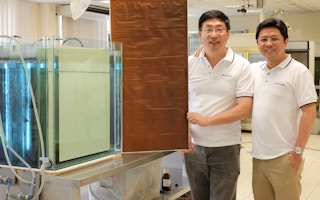A young startup at Nanyang Technological University (NTU) has developed a first-of-its-kind multifunction water filtration membrane. With its expected cost savings and superior performance, the new invention has the potential to render current membranes in the water industry obsolete.
This made-in-NTU membrane lasts twice as long when compared to conventional membranes, is highly resistant to breakage, and has anti-bacterial and anti-biofouling properties. Another groundbreaking characteristic – it allows for an unprecedented flow rate of at least ten times faster than current water filtration membranes.
Developed by NTU start-up Nano Sun, at the centre of this breakthrough multifunction membrane is a patented titanium dioxide nanotechnology. Titanium dioxide nanoparticles are proven to kill bacteria and to break down organic compounds in waste water with the help of sunlight or Ultra Violet (UV) rays.
Invented by Associate Professor Darren Sun, from NTU’s School of Civil and Environmental Engineering, the startup is cofounded by Adjunct Professor Wong Ann Chai from NTU’s Nanyang Business School, formerly an investment banker from DBS Bank and Normura Singapore.
“
What the world needs – and what we have developed - is a breakthrough technology which can turn large volumes of polluted or untreated water into drinking water quickly, safely and at a fraction of the cost
Associate Professor Darren Sun, NTU’s School of Civil and Environmental Engineering
Despite Nano Sun being only two years old, it has an valuation of US$80 million, due to the industry’s recognition of the immense potential of the new technology that can help to solve some of the most critical problems faced by the water industry.
“With more of the world’s population moving into urban cities and generating more wastewater, there is a real need for cost-effective technology. Traditional polymer-based water filtration membranes are faced with issues such as fouling and high breakage, while the developing countries with high industrial output are generating wastewater which is increasingly harder to treat.”
“What the world needs – and what we have developed - is a breakthrough technology which can turn large volumes of polluted or untreated water into drinking water quickly, safely and at a fraction of the cost,” said Prof Sun, who has developed various systems that are used in water treatment plants all over the world, and is the Shimizu Visiting Professor at Stanford University in United States.
Solving problems faced by the water industry
Biofouling and organic compounds are a huge problem for the $200 billion global water industry, as traditional polymer-based water filtration membranes tend to clog up with what they have filtered out.
With the new Nano Sun’s membranes, biofouling is greatly reduced as organic material and bacteria are killed and destroyed when they come into contact with the membranes.
Any organic material that does not decompose can also be quickly burnt by putting the membrane in an oven heated to 700 degrees Celsius, since it is able to withstand high heat unlike traditional polymer membranes.
Industry interests
Co-founder and Managing Director of Nano Sun, Adjunct Prof Wong, said the applications and implications for their new technology are wide-ranging.
“Apart from our capabilities to improve wastewater treatment and desalination plants, multinational companies in the food and beverage industry have also expressed interest in using our technologies in their production processes,” said Adjunct Prof Wong, who teaches finance at NTU.
“The scope for our membranes is far ranging and of benefit to companies in the chemicals, food and biomedical industries.”
Several water agencies in the region and multinational corporations (MNCs) have already indicated interest in the NTU invention, which is now ready for sale in the market.
Nano Sun recently signed deals with PT Pelaksana Jaya Mulia, a large Indonesian company, to provide 10,000 cubic metres of clean water per day. In China, Nano Sun is working with an industrial paper mill in Guangzhou to optimise their wastewater treatment processes, which will lead to savings of S$3 million over the next five years.
Locally, Nano Sun is in discussion with local water agencies and companies, which own and operate large-scale energy-efficient integrated power and water reclamation plants to test bed its innovative technologies.
Technology with a heart
Nano Sun is also investing heavily to miniaturize the membranes into more handy products, which can be used for household needs as well as humanitarian aid and disaster relief, said Adjunct Prof Wong, who is also an alumni of Massachusetts Institute of Technology (MIT) in the United States.
“Let us not forget our hearts. Apart from household filters, we are also working to develop a low-cost water purification water bottle, for use in developing countries and for disaster relief efforts,” he added.
The startup is now working to scale up its production of membranes from 7 metres per day to 100 metres per day. It also aims to explore other product possibilities such as air filtration, disinfection (bandages) and solar cell industries.
For example, Nano Sun’s new nanotechnology has proven to be able to:
- generate hydrogen (a clean fuel) while treating wastewater;
- replace plastics in bandages as an anti-bacterial material;
- work as an effective N95 air filter; and
- function as a base material for a low-cost solar cell with high efficiency.
Nano Sun is incubated by NTUitive, a wholly-own subsidiary of NTU, which supports startups by faculty and students by providing mentorship advice and access to various funding sources.
This news was originally published here.










